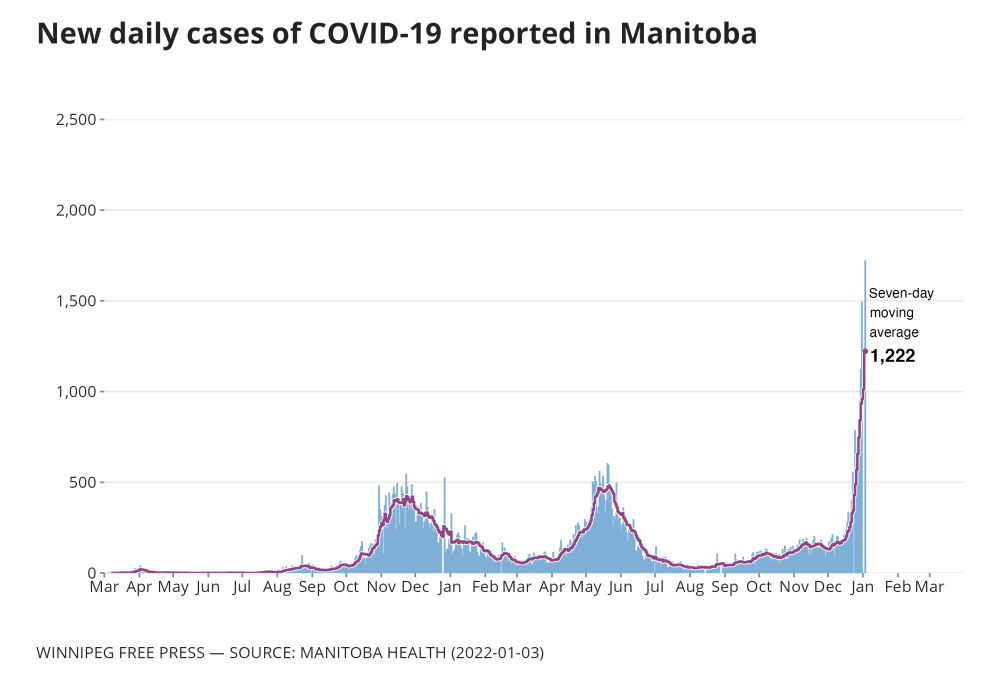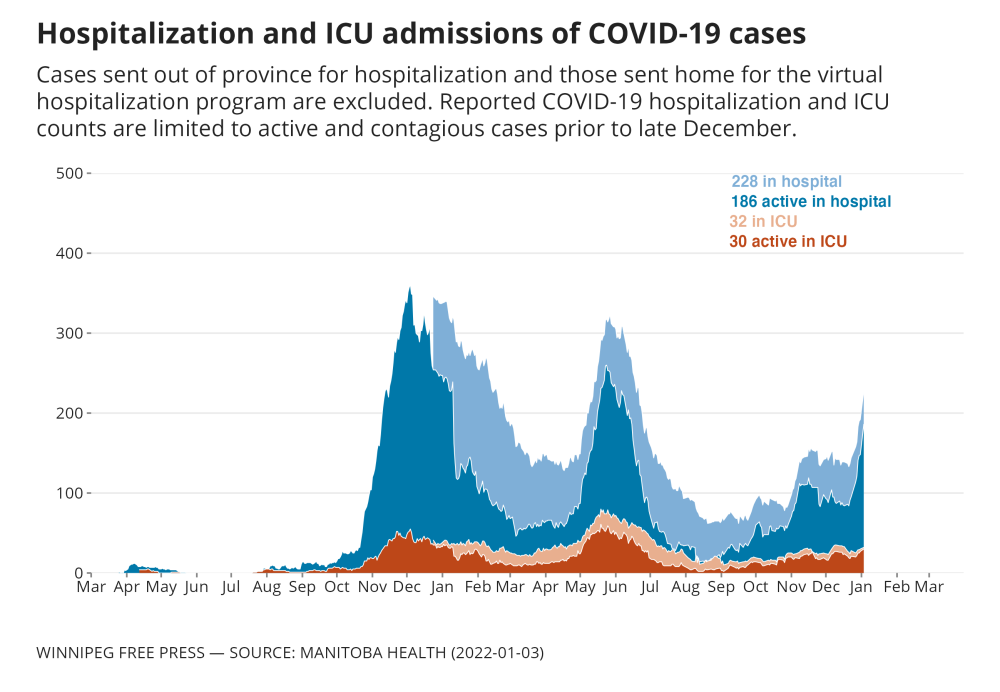New isolation rules for health-care workers in effect
Advertisement
Read this article for free:
or
Already have an account? Log in here »
To continue reading, please subscribe:
Monthly Digital Subscription
$0 for the first 4 weeks*
- Enjoy unlimited reading on winnipegfreepress.com
- Read the E-Edition, our digital replica newspaper
- Access News Break, our award-winning app
- Play interactive puzzles
*No charge for 4 weeks then price increases to the regular rate of $19.00 plus GST every four weeks. Offer available to new and qualified returning subscribers only. Cancel any time.
Monthly Digital Subscription
$4.75/week*
- Enjoy unlimited reading on winnipegfreepress.com
- Read the E-Edition, our digital replica newspaper
- Access News Break, our award-winning app
- Play interactive puzzles
*Billed as $19 plus GST every four weeks. Cancel any time.
To continue reading, please subscribe:
Add Free Press access to your Brandon Sun subscription for only an additional
$1 for the first 4 weeks*
*Your next subscription payment will increase by $1.00 and you will be charged $16.99 plus GST for four weeks. After four weeks, your payment will increase to $23.99 plus GST every four weeks.
Read unlimited articles for free today:
or
Already have an account? Log in here »
Hey there, time traveller!
This article was published 03/01/2022 (1435 days ago), so information in it may no longer be current.
Fever-free, COVID-19-positive health-care workers can return to caring for patients six days after becoming ill with the virus, as nursing homes and hospitals struggle to maintain staffing levels and case counts surge across the province.
On Monday, Shared Health changed COVID-19 isolation protocols for health-care workers to align with public health orders that came into effect Jan. 1, cutting quarantine for fully vaccinated Manitobans from 10 days to five.
In a memo to staff dated Jan. 3, Shared Health said fully vaccinated health-care workers who may have lingering symptoms of COVID-19 but have not had a fever for 24 hours can go back on shift after completing a five-day quarantine.
Workers will no longer be required to report their positive result to occupational and environmental safety and health and do not have to be cleared to return to work, the memo states.
The change applies retroactively to workers who tested positive on or after Dec. 21. No changes to isolation protocols have been made for unvaccinated staff.
Long Term and Continuing Care Association of Manitoba executive director Jan Legeros said nursing homes are facing significant human resource challenges and the shortened quarantine period will help stabilize a sector already short-staffed.
“There are a number of staff who either have symptoms who are waiting for test results or who have tested positive and are isolating,” Legeros said. “Relaxing the isolation requirements will certainly help to get our staff back to care for the residents.”
On Monday, the province reported another 5,411 confirmed COVID-19 infections since Dec. 31 — including a record-setting 1,830 cases Saturday and five-day positivity rate of 37.9 per cent — while hospitalizations increased by 36 patients.
According to the Winnipeg Regional Health Authority, COVID-19 was also spreading in 11 personal care homes and seven health centres or hospital wards.
At the 200-bed Saul and Claribel Simkin Centre in southwest Winnipeg, at least 16 staff have tested positive in the past eight days, with new staff cases being reported daily, said director of care Alanna Kull.
Employees are being moved throughout the facility and being offered additional shifts to make up for the sudden reduction in available staff while designated essential care givers are assisting with meals, Kull said.
To free up staff to provide basic care, some residents are being given hospital gowns to wear instead of their typical clothes to cut down on dressing time and laundry, Kull said.

Tub baths and showers have also been suspended in favour of sponge baths, and linens are only being changed if wet or soiled.
Care home operators can choose whether or not to permit vaccinated staff who have recently tested positive for COVID-19 to return at the six-day mark, Legeros said. Some of those staff may be deployed to care for residents who have COVID-19 or would only care for triple-vaccinated residents, she said.
“We believe that staff who have isolated for five days, who are fully vaccinated and are asymptomatic can safely return to work without high risk of infecting the residents.“It’s just so critical that we have the hands-on care available,” Legeros said.
Last week, when discussing shortened quarantine periods, chief provincial public health officer Dr. Brent Roussin told reporters there is still a risk people who test positive for COVID-19 will be infectious after five days.
Public health officials also advised the general public not to visit high-risk settings or have non-essential contact with people who are vulnerable to severe outcomes in the five day period after they leave isolation.
Sinai Health director of geriatrics Dr. Samir Sinha described allowing health-care workers to return five days after a positive result as a bet the majority will not be infectious.
“You are going to have people who are infectious, who are back at work, who are tired, who are exhausted and in a low-staffed environment,” Sinha said. “And this is exactly how the virus can prey, it’s how it’s preyed in long-term care settings, and it can explode like wildfire.”
Health-care workers should also be supported by occupational safety and health to ensure they’re following protocols and to provide oversight and guidance, Sinha said.

“This is a policy that I appreciate is being introduced because it’s about preserving human resources capacity in a system that’s dealing with an onslaught of cases,” Sinha said. “But at the same time, it is a policy decision that will lead to more health-care workers being infected and, unfortunately, people needing care.”
In a statement to the Free Press, a spokesman for Shared Health said the change in policy is in line with “emerging evidence the new Omicron variant of concern is most infectious early in the course of the illness.”
Fully vaccinated, COVID-19 positive workers who return to the job will also be required to take breaks in non-common areas and follow strict hand hygiene and personal protective equipment protocols.
“Health-care workers returning from self-isolation are being reminded of the importance of vigilance regarding use of PPE, physical distancing, and avoiding common areas at any time their respiratory protection is removed,” the statement said.
danielle.dasilva@freepress.mb.ca

Our newsroom depends on a growing audience of readers to power our journalism. If you are not a paid reader, please consider becoming a subscriber.
Our newsroom depends on its audience of readers to power our journalism. Thank you for your support.
History
Updated on Monday, January 3, 2022 7:26 PM CST: Adds additional info, background and quotes
Updated on Tuesday, January 4, 2022 6:26 AM CST: fixes typo
Updated on Tuesday, January 4, 2022 8:05 AM CST: Adds byline
Updated on Tuesday, January 4, 2022 12:18 PM CST: Updates headline


